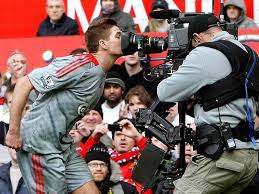By Mark Baber
August 22 – Last week the Premier League told BBC Newsbeat that they were going to clamp down on the sharing of goal videos online, claiming the tweeting of copyrighted material is illegal. However, experts on copyright law have challenged that assertion, pointing to a new provision in copyright law, due to take effect in October, which will provide a right under certain circumstances to quote from copyrighted materials.
Uploading unofficial goal videos on social media has, of course, become immensely popular on services such as Twitter, YouTube and Vine. According to Dan Johnson, director of communications at the Premier League: “You can understand that fans see something, they can capture it, they can share it, but ultimately it is against the law.
“It’s a breach of copyright and we would discourage fans from doing it, we’re developing technologies like gif crawlers, Vine crawlers, working with Twitter to look to curtail this kind of activity.”
The Premier League argues that it has to protect their intellectual property and the online rights have been bought by The Sun and The Times who are providing the goals on monthly subscription services.
News International, publisher of the Sun and Times newspapers, has reportedly paid £20 million for the rights to show highlights from Premier League matches online, and clearly isn’t happy about goals being posted on free-to-view social media within seconds of them being scored.
Nevertheless, an article by Pinsent Mason’s Out-law.com written by copyright law expert Iain Connor and commercial rights and contracts specialist Samantha Livesey, suggests the legal position is not as clear as the Premier League have suggested.
Although a 2011 ruling by the Court of Justice of the EU (CJEU) determined that live sporting events do not of themselves qualify for copyright protection, broadcasts of those events and film, sound recordings, graphics, music and other features included within such a broadcast can be said to be copyrightable. This is the case even if the clips used are quite small, as long as they are deemed a “substantial part” of a copyrighted work.
However, a new exception to copyright due to come into force in October will introduce a general qualified right to quote copyrighted works which may make it possible for individuals and even companies to justify the posting of Premier League clips online provided they provide sufficient acknowledgment.
Ultimately only a court will be able to make it clear exactly what the new law allows and so it seems likely the scope of this exception will be determined by the courts, in a football-related case, in the not too distant future.
Contact the writer of this story at moc.l1744772352labto1744772352ofdlr1744772352owedi1744772352sni@r1744772352ebab.1744772352kram1744772352

